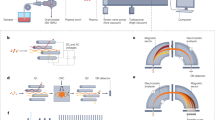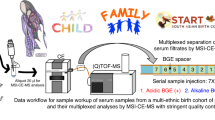Abstract
THE elements present in mammalian blood are of interest to the biochemist because changes in the concentrations of different elements can sometimes be correlated with certain pathological conditions, and analytical data can also be used to determine whether or not a certain element is essential to the maintenance of life. Many of the elements of interest are present at the p.p.m. level or below.
This is a preview of subscription content, access via your institution
Access options
Subscribe to this journal
Receive 51 print issues and online access
$199.00 per year
only $3.90 per issue
Buy this article
- Purchase on Springer Link
- Instant access to full article PDF
Prices may be subject to local taxes which are calculated during checkout
Similar content being viewed by others
References
Brown, R., and Wolstenholme, W. A., Proc. Eleventh Conf. Amer. Soc. Test. Mat. Com. E–14 (1963).
Craig, R. D., Errock, G. A., and Waldron, J. D., Advances in Mass Spectrometry, edit. by Waldron, J. D. (Pergamon Press, 1959).
Bowen, H. J. M., U.K. Atomic Energy Auth. Rep., No. R.4196.
Author information
Authors and Affiliations
Rights and permissions
About this article
Cite this article
WOLSTENHOLME, W. Analysis of Dried Blood Plasma by Spark Source Mass Spectrometry. Nature 203, 1284–1285 (1964). https://doi.org/10.1038/2031284a0
Published:
Issue Date:
DOI: https://doi.org/10.1038/2031284a0
This article is cited by
-
Multiple correlations of mRNA expression and protein abundance in human cytokine profile
Molecular Biology Reports (2014)
-
Bestimmung von Fe, Co, Cu, Zn, Se, Rb und Cs in NBS-Ochsenleber, Blutplasma und Erythrocyten durch INAA und AAS
Fresenius' Zeitschrift für analytische Chemie (1981)
-
Simultaneous determination of seven elements (Cl, K, Ca, Br, Fe, Cu, Zn) in blood serum by PIXE
Fresenius' Zeitschrift f�r Analytische Chemie (1980)
Comments
By submitting a comment you agree to abide by our Terms and Community Guidelines. If you find something abusive or that does not comply with our terms or guidelines please flag it as inappropriate.



